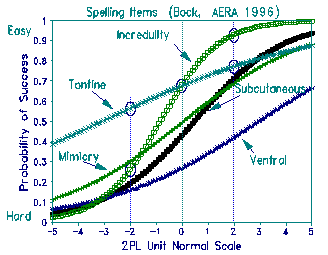
Items and constructs are in constant tension. Each item is intended to probe an underlying construct, but each item also has idiosyncrasies. Only when items are coerced into a sufficient level of cooperation does a stable construct emerge. The process of coercion includes painstaking item writing, item selection, investigation of misfit statistics and careful consideration of the integrity of the evolving construct as it becomes defined by an emerging item hierarchy.
In its celebration of item idiosyncrasies, IRT abandons the construct. At NCME 1996, Darrell Bock presented a Table of 2-PL (two-parameter logistic model) parameters for 100 spelling items. The 2-PL model parameterizes, as "item discrimination", differential performance on items by high and low performing examinees. Since differential item performance disrupts construct stability, variation in "item discrimination" is identified as misfit in a Rasch analysis.

Allowing each item its own life muddles the construct. ICCs for 5 words from Bock's 100 spelling items are shown in the Figure. Bock reports that these words show good fit to his 2PL model. But the item hierarchy for low performers at -2 contradicts that for high performers at +2. For middle performers at 0, tontine and incredulity are equally easy to spell. But for low performers at -2, tontine was easier to spell than incredulity, while for high performers, tontine was harder to spell than incredulity. Since a clear construct is required in order to know what measures mean, descriptive IRT is not measurement.
Construct problems with descriptive IRT. Wright BD, Bock RD. … Rasch Measurement Transactions, 1996, 10:1 p.481
| Forum | Rasch Measurement Forum to discuss any Rasch-related topic |
Go to Top of Page
Go to index of all Rasch Measurement Transactions
AERA members: Join the Rasch Measurement SIG and receive the printed version of RMT
Some back issues of RMT are available as bound volumes
Subscribe to Journal of Applied Measurement
Go to Institute for Objective Measurement Home Page. The Rasch Measurement SIG (AERA) thanks the Institute for Objective Measurement for inviting the publication of Rasch Measurement Transactions on the Institute's website, www.rasch.org.
| Coming Rasch-related Events | |
|---|---|
| Jan. 16 - Feb. 13, 2025, Fri.-Fri. | On-line workshop: Rasch Measurement - Core Topics (E. Smith, Winsteps), www.statistics.com |
| Apr. 8 - Apr. 11, 2026, Wed.-Sat. | National Council for Measurement in Education - Los Angeles, CA, ncme.org/events/2026-annual-meeting |
| Apr. 8 - Apr. 12, 2026, Wed.-Sun. | American Educational Research Association - Los Angeles, CA, www.aera.net/AERA2026 |
| May. 15 - June 12, 2026, Fri.-Fri. | On-line workshop: Rasch Measurement - Core Topics (E. Smith, Winsteps), www.statistics.com |
| June 19 - July 25, 2026, Fri.-Sat. | On-line workshop: Rasch Measurement - Further Topics (E. Smith, Winsteps), www.statistics.com |
The URL of this page is www.rasch.org/rmt/rmt101j.htm
Website: www.rasch.org/rmt/contents.htm